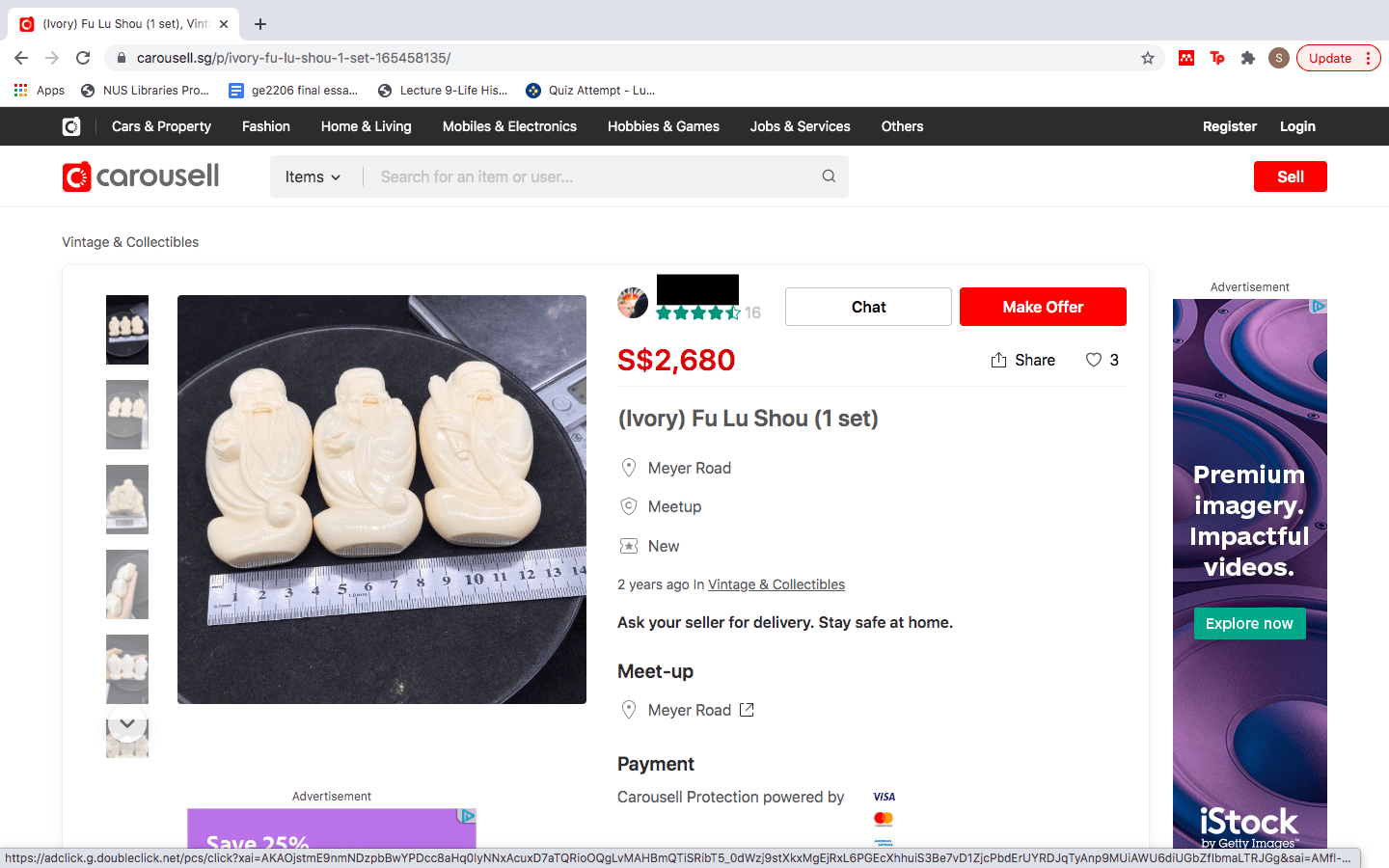Hello everyone!
After my post last week, Dr. Coleman implored me to explore whether wildlife specimens and parts are truly sold online! This started my journey into various search engines. I searched the keywords (“wildlife”, “ivory”, “rhino”, “tiger”, “exotic pets”, “exotic plants”) from various online shopping platforms such as Google, eBay, Alibaba, Gumtree, and Carousell.
However, my search proved futile as I was unable to find any illegal products especially for plants or perhaps my ability to spot them was not good enough.

Bager paw sold on ebay. Source: URL
This was one of the only few wildlife specimens I could find and even this was said to be in accordance with legislation. This could also be due to the fact that Google, eBay, and Alibaba are all involved in the “Coalition to End Wildlife Trafficking Online“, which aims to curb illegal wildlife trade online. For Singapore based websites such as Gumtree and Carousell, strict government monitoring, or the fear of whistleblowers in the community could be why I failed to yield any results as well.

Ivory sold on carousell in Singapore. Source: URL
This was the closest thing I could find that could potentially be ivory on Carousell. The sale of ivory, however, is legal in Singapore if one is already in possession of it which might create a loophole in legislation enforcement. The good news is that Nparks have recognized this loophole and the domestic sale of ivory will be banned from Sept 1, 2021 onwards!
This led me to think that perhaps due to the laws put in place, dealers used social media platforms such as Facebook, QQ, Wechat, Tieba, etc which are more covert than traditional online websites such as those mentioned above. Although I yielded unsuccessful results from my Facebook and Wechat search, there have been increasing reports (Facebook and Wechat) of its use for illegal wildlife trade. Perhaps I just wasn’t in the “inner circle” or posts were made in their native languages! Furthermore, due to the wildlife market closures in China, there is also a possibility that they have shifted their sales to social media and online shopping platforms!
When I asked my friend who was a Chinese national who frequently used WeChat, she said that because the app is partially under government observation, people will rarely openly publicize wildlife parts on Wechat. Moreover, she said that Chinese nationals often prefer to buy it from the store itself as these wildlife parts could be quite expensive and the things sold online could potentially be fake, which is understandable. If I’m not wrong, there was a TRAFFIC report before saying how there were many high quality fake helmeted hornbill products which could easily pass off as the real deal online!
My friend then continued to tell me that if they were to buy online though, it is usually through word of mouth from friends or family relatives and they use social media platforms to contact them directly. If I remember correctly, a few years ago a friend even asked me once on WhatsApp before whether I wanted a snake, something which I could not easily find in the market if I searched myself. Hence, really showing how social platforms act as vectors for the trade.
Facebook, as part of the “Coalition to End Wildlife Trafficking Online”, has also been taking steps to curb the trade on their platforms. While online platforms can aid in efforts, legislations in different countries also play a critical role in curbing illegal wildlife trade both online and offline. Hence, we will be looking into the importance of legislation in our next post and also the impacts of the pandemic on illegal wildlife trade in time to come!

October 21, 2020 at 4:01 pm
Hi Stacia
Really informative post on how wildlife products are still sold online these days. I do believe that no matter how much the government clamps down on the illegal wildlife market, it is still prevalent and ongoing on other platforms, that are probably only made known to the ‘inner circle’. Not sure if you have heard of the DarkWeb (a highly secure underground intranet) before, but do you think the wildlife market has potentially shifted into the DarkWeb since the government has little to no control over it?
October 26, 2020 at 2:25 pm
Hi Wen Han,
Yes, I do understand your concerns about how there are limitations to what governments can do. I do believe, however, perhaps not in Singapore’s context more can be done by governments to shut down illegal wildlife trade online. As for the dark web, I have heard of it but I never actually tried to use nor do I have friends that use it but yes I do believe there is the potential for the market to have shifted there especially in countries where social media is highly controlled by the government!